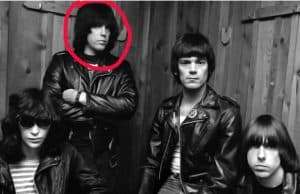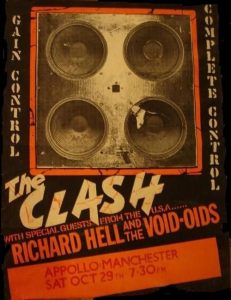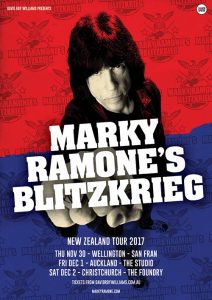Marky Ramone: The 13th Floor Interview
For over 15 years, Marky Ramone (aka Marc Bell), pounded the skins for The Ramones. During that time he played over 1700 shows and recorded 10 albums with the legendary punk rockers including Road To Ruin, End Of The Century and the soundtrack for Rock & Roll High School.
With Joey, Johnny, Tommy and Dee Dee gone, Marky is left to carry on their legacy. He’ll do just that when he and his band tour New Zealand with shows in Christchurch, Wellington and Auckland in November and December.
The 13th Floor’s Marty Duda spoke to Marky Ramone recently about The Ramones’ legacy and what he thinks of today’s punk rockers.
Click here to listen to the interview with Marky Ramone:
Or, read a transcription of the interview here:
MD: Is this the first time you’ve been to New Zealand since The Ramones played here in ’89?
 MR: Definitely! Now, they’re all gone and I have to continue to keep this legacy alive. They died too young to enjoy the fruits of their labour. It was sad, the way they died, and I can’t stop thinking about it; so, instead of thinking about it, I’ll play it; you know what I mean?
MR: Definitely! Now, they’re all gone and I have to continue to keep this legacy alive. They died too young to enjoy the fruits of their labour. It was sad, the way they died, and I can’t stop thinking about it; so, instead of thinking about it, I’ll play it; you know what I mean?
MD: Yeah, it must be tough having them all gone.
MR: Well, yeah. We were band mates, brothers. We fought, we made up, we played the music. I did seventeen hundred shows with them. I was with them for fifteen years: you get to know people very well.
MD: I can imagine. Because you guys were, pretty much, living in a van; you weren’t flying on big Lear jets; it was pretty close quarters.
MR: No! We all had our assigned rows, and that was for fifteen years; and, after a while, it could get a little grating, but we persevered, and that was the result.
MD: I think the one thing that’s come out of all this is The Ramones legacy seems to have grown and grown over the years, and people realise how important the band was and how innovative you guys were: nobody else made that sound until you guys did.
MR: Well, particularly even the young generation understands that. Because of the multimedia, internet stuff, they can hear things; they can explore. Yeah, The Ramones definitely created a sound. Tommy – who asked me to join the band after he left only at three and a half years – wanted me in the band; so, I was with Richard Hell & The Voidoids – another group that was from New York City in the punk scene – but we were label mates. So, Tommy left and I joined, and, luckily, he was there to produce the first album I did with them. The first song I recorded with them was I Wanna be Sedated; so, that totally worked…. I jumped into it, and a couple of months later, we headed to Rock ‘n’ Roll High School, and then a couple of months later was with Phil Spector; so, it was an onslaught!
https://www.youtube.com/watch?v=JBN1CkyRzmE
MD: I remember I interviewed Joey and Johnny just before they were going to do Rock ‘n’ Roll High School, and I got the feeling that the band was at the point where they really felt that it was a make or break situation with them: that working with Phil Spectre and doing this movie was a thing that was going to put them over the top. Was that something that you guys talked about much?
MR: Well, it got us a lot more popularity. It didn’t put us in the top ten, but that was something we needed at that moment: a cult classic film, at the time, and to work with the most famous producer in America; so, we were very happy that these things came along, because it did create an interest and a curiosity from people who weren’t really quite aware of The Ramones.
MD: Air play was still hard to get for you guys, which must have been very frustrating.
MR: Yeah, well, when you have lyrics like, “Now I want to sniff some glue,” and, “Gimme, gimme shock treatment,” “Hey! Ho! Let’s go! Shoot ‘em in the back,” I mean, let’s face it, at that time, some DJs were probably very squeamish about playing those songs, because they would have gotten phone calls from the kids’ parents.
MD: You mentioned Phil Spector. You guys worked with quite a few interesting producers – especially during the ‘80s – like Graham Gouldman and Ritchie Cordell and Bill Laswell. I was just wondering if you could shed some light on what it was like to work with some of those guys, and if that was a way that you guys saw forward to get some air play?
MR: With Phil, we had the largest hit, Baby, I Love You, which was, basically, in Europe. I loved Phil, Joey loved Phil; we always loved his sound. The Ramones are very influenced by the Phil Spector girl group bands; so, when he wanted to produce us, we jumped right onto it. The result was an interesting combination of two walls of sound, but a lot of punk purists, at the moment that it did come out, didn’t like it – but they like it a lot more now. They wanted another three chord album; and you can’t keep making a three chord album. That’s why, when we did Road to Ruin – which was the fourth album – we added a little more spice to it, and we were lucky that the people reviewing the album… didn’t say, “Oh, here’s another three chord album. Did we really need this?” Road to Ruin was, basically, our… Revolver – like The Beatles album.
MD: Graham Gouldman must have been interesting to work with….
MR: Loved him! Loved that album Pleasant Dreams; loved The KKK Took My Baby Away. I loved the way that album was produced, because it was a pop-punk album, but it had grittiness to it also. It really showed off a lot of things that the band had, that we didn’t really want to present before, because we didn’t want to make things a little more complicated because of the simplicity of the first three albums. Pleasant Dreams was, basically, our pop-punk album. Graham Gouldman was wonderful to work with.
https://www.youtube.com/watch?v=hT1OKo1rT84
MD: One of my favourites is the Acid Eaters record – the cover versions of all these ‘60s classics – and my understanding is you picked out quite a few of those songs to play. Are you the archivist in the band?
MR: No… what I did was, I looked at all these songs, and I said, “What can we play, and how can we put The Ramones’ sound to them?” I think I picked nine of them out of that album, but I didn’t like the production of the album. Now, the guy who produced it, hardly knew of The Ramones, was suggested by the management, and I could have done a better job. The thing is that it did well, it was respectful of the ‘60s sound, and there were a few good songs on there.
 MD: Yeah! There definitely were some great songs on there. You mentioned playing with Richard Hell and The Voidoids, and, if I’m not mistaken, you guys toured the UK with The Clash…. What was that like? The American punk thing meeting the British punk thing head on at that point. What was the reaction?
MD: Yeah! There definitely were some great songs on there. You mentioned playing with Richard Hell and The Voidoids, and, if I’m not mistaken, you guys toured the UK with The Clash…. What was that like? The American punk thing meeting the British punk thing head on at that point. What was the reaction?
MR: The Ramones, obviously, with Patti Smith, Blondie and The Dolls and Television started at CBGBs; and you got to give Iggy credit too, because his band of Stooges were like a garage, punk rock band. But The Ramones solidified it: they went to England, and they were all in the audience watching them. Then I toured a year later with Richard Hell and The Voidoids with The Clash, and it was great! They’re nice people, they were a lot of fun to be around, and we all got along, and that what mattered to me. We would all watch each others’ set, and, until Joe died, I was friends with him – another one who bit the dust, unfortunately, of great talent.
MD: How would you compare the English punk scene to the New York punk scene?
MR: It was more political. A lot of people, at that time in England, were on the dole There were a lot of union strikes. There were a lot of downtrodden situations. So, what’s better than being able to say something in a two minute song to express how you feel about what’s going on in society at the moment? Luckily the managers of the band – Malcolm McDowell and Bernard Rhodes, who managed The Clash – said, “Hey, let’s get on the political thing,” and they did.
MD: Do you follow much of the current punk scene? Is there anything that you check out? Do you hear from contemporary bands much?
MR: I have a radio show on Sirius XM in America, and you’ve got to keep your ears open to present new things. But I’ll tell you, a lot of it sounds the same, and it seems very gentrified. Unless you lived it, it’s different than just saying, “hey, I want to be a punk rocker;” there’s a difference. You can’t just go get the tattoos, put your Converse on, wear all black and go, “Wow! I’m a punk rocker now!” That’s what it’s come to, but there are a few bands that have been around for twenty five years who continue to keep the flame going. Rancid – bands like that – individual members of Rancid, when they do their own things. The Loved Ones were very good, The River Boat Gamblers. There’s a band out of England called The Gallows that are really good; so, you’ve just got to keep your ears open to avoid pretence.
MD: What’s the New York City music scene like these days?
MR: Well, it’s in Brooklyn now. New York’s dead; it’s all in Brooklyn. There are neighbourhoods, now, that have great clubs, and all the punk bands go there – and indie bands. So, if you’re a band just starting, and you want to present yourself to seven or eight hundred people, there are clubs here that can house that many people; so, that’s a good thing for Brooklyn, great for bands to showcase what they have to offer, and, hopefully, they can get some record deals.
 MD: Who have you got coming with you, in the band, when you get here, to New Zealand, in a few weeks?
MD: Who have you got coming with you, in the band, when you get here, to New Zealand, in a few weeks?
MR: My singer’s name is Paul, my bass player’s name is Andy, and then I have my guitar player, whose name is Aurelian… you’ll see! I hope you come!
MD: I will definitely be there!
MR: We’ve played in front of bigger audiences than The Ramones have! I did Rock in Rio with my band: two hundred and fifty thousand people, and, honestly, I couldn’t see the end of the crowd; that’s how big that was, and I was overwhelmed!
Marky Ramone NZ Tour Dates:
Thursday 30th November, San Fran, Wellington
Friday 1st December, The Studio, Auckland
Saturday 2nd December, The Foundry
, Christchurch